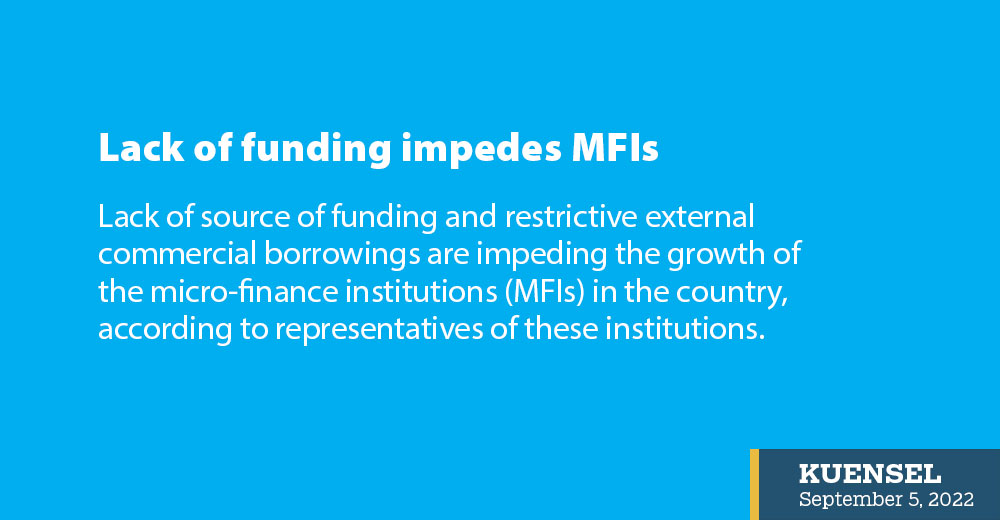Thukten Zangpo
Lack of source of funding and restrictive external commercial borrowings are impeding the growth of the micro-finance institutions (MFIs) in the country, according to representatives of these institutions.
The MFIs in the country provide credit delivery in rural areas for agriculture, small businesses, farms, and machinery, which help to uplift the rural economy.
However, the MFIs lending rates are relatively high compared to the conventional banks because of the high operation costs. The MFIs provide loans at interest rates from 15 percent to 22 percent per annum. As per the Royal Monetary Authority, the MFIs can lend up to Nu 0.5 million (M).
Chief executive officer (CEO) of the Tarayana Micro-finance Private Limited (TMF), Karma Thinley Dorji said that there are two types of sources of funding-grants and soft lending from banks.
TMF is owned 75 percent by the Tarayana Foundation and 25 percent by the two FDI investors. TMF provides an interest rate of 15 percent. Currently, there are 350 clients with Nu 40M loans disbursed.
He said that the micro-finance institutions could not borrow money from local banks because of high-interest rates. “We cannot borrow at an interest rate lower than 9 percent from the local banks, if we borrow at 9 percent and give to the clients at 15 percent, we would not be able to manage with high costs of operation.”
Karma Thinley Dorji also said that the finance ministry has restricted external commercial borrowings (ECB). “ECB guidelines could be reviewed and revised to facilitate access to finance.”
He said that the ECB is available at a low-interest rate of 1 percent to 2 percent.
ECB refers to commercial loans in the form of bank loans and suppliers’ credit availed from non-resident lenders. The government put a hold on the ECB to safeguard the country’s foreign currency reserves.
The only incorporated companies registered under the Companies Act of Bhutan, but excluding financial institutions, individuals, trusts, Non-Governmental Organisations and cooperatives are eligible borrowers, according to the ECB guidelines.
Karma Thinley Dorji also said that the government could also look into providing funds to MFIs at a lower interest rate.
“With lack of funding, the MFIs loan portfolio remains the same and is not able to grow,” he said.
Tarayana Micro-finance Private Limited usually looks for donor funding that is project-based.
Bhutan Micro-finance Private Limited’s (BMPL) CEO, Ugyen Dorji said that if the MFIs get low-interest funding, their interest rate could be reduced. “Although there is more demand, we lack funding.”
He added that the BMPL pays the depositors an interest rate of 10 percent to 10.5 percent.
He also said that if the MFIs were also allowed to float initial public offerings in the share market, the MFIs could see growth.
BMPL provides agriculture, housing loans and micro-enterprise or small business loans at 18 percent, 18.5 percent and 19.5 percent respectively.
There are 345 borrowers: 180 in agriculture, 68 in housing, and 53 in micro-enterprise or small business with total loan disbursement of Nu 65M.
Ugyen Dorji also said that a loan ceiling of Nu 0.5M is not adequate to build a decent house because the cost of the materials has gone up.
The CEO of TMF also said that the microfinance institution is coming with the digital payment system integrated with the Bank of Bhutan’s Mbob expected to launch in September. “This would reduce the operational costs.”
Renew Micro-finance Private Limited’s CEO, Tshering Dema said that they provide loans at 15 percent to 22 percent which are high because of high transactional and operational costs including the company’s large infrastructure and strength of employees.
“High operational cost is the nature of MFIs and it would be wrong to compare with the conventional banks. Geographical terrain is also a challenge,” Tshering Dema said.
She said that the break-even interest rate is at 19 percent. “Clients want to reduce the interest rate, however, we also have to look for our sustainability,” Tshering Dema said. “Responsible borrowers would be incentivised with the variable interest rate to encourage and motivate them. The interest rate could go as low as 15 percent.”
To reduce interest rates, she said that Renew Microfinance is coming up with innovative mechanisms of doing business like digital banking that will bring down the operational cost.
However, Tshering Dema said that since most of the clients are illiterate, digital banking would be expensive. “If we want to come up with an app we really have to customise it, it would be even more expensive.”
There are currently 26,000 clients and have disbursed Nu 242M. Most of the defaulters are in the agriculture sector. Tshering Dema said that they are also coming up with crop insurance for clients with the help of the World Food Planet. The company’s non-performing loan rate stands at 6 percent.
Renew Micro-finance also plans to start green finance, namely biogas, and solar panels. Tshering Dema said that solar panels are expensive and subsidies from the government would be helpful to the clients.


